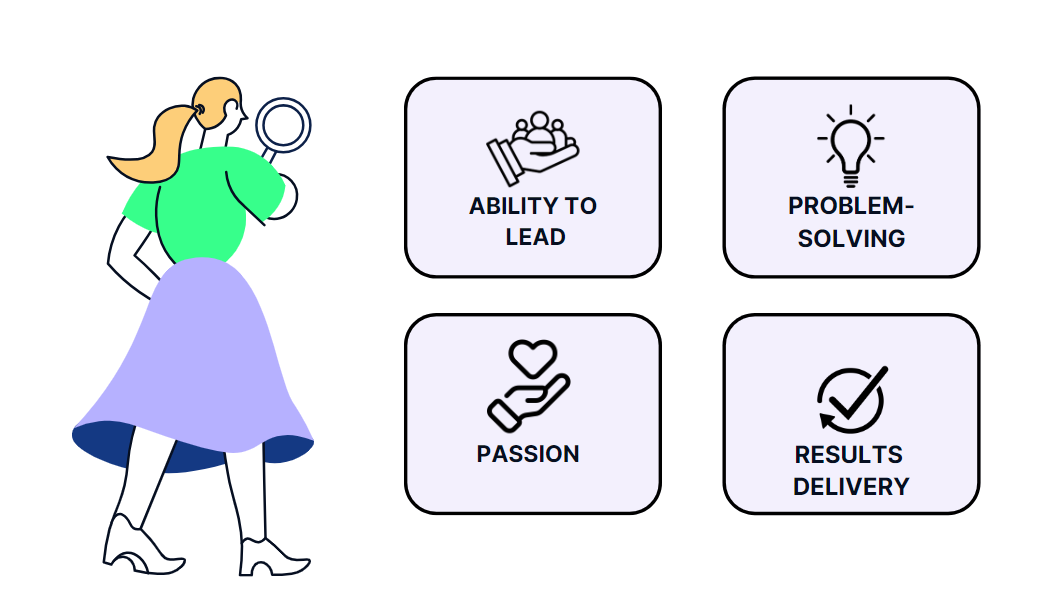The Application Process at Bain & Company
The application process at Bain consists of four stages:

- The first step in the application process at Bain is crucial and requires careful preparation. Make sure your cover letter is specifically tailored to Bain — avoid generic statements and emphasize why you are a great fit for the company and the position. Clearly showcase your skills and experiences. A compelling cover letter can help you leave a lasting impression and boost your chances of advancing to the next round.
- The online assessments include questions on numerical reasoning, logical reasoning, and situational judgment tests. Bain has developed its own tests for candidates, such as the Bain Sova Test, which are similar to common assessments used by other employers.
- In the first round, you'll typically be interviewed by a junior consultant with 3-6 years of experience. This will be your first encounter with a case interview. Usually, the interviews consist of two parts: about 15 minutes of “fit questions", such as “Why consulting?” or “Tell me about a situation where…,” followed by a 45-minute case interview.
- The second-round interviews are structured similarly to the first but are conducted by more senior team members, typically directors or junior/senior partners. These consultants will conduct a stricter evaluation and ultimately make the hiring decision.
👉Partner with a coach and give your career the boost it needs! Our coaches are experienced (former) consultants who will provide personalized preparation plans and strategies to help you excel in your case interview.
Types of Interviews
Bain uses three different types of interviews: case interviews, experience interviews, and written case interviews (also known as structured case interviews). While the case interview format is the most common, you should prepare for all three types unless the recruiters specify which interview format you’ll be facing.
Case Interview
Case interviews at Bain are based on real client projects. Interviewers are encouraged to use their own assignments for case questions since they’re familiar with them and can easily provide data and context. This format closely mirrors the actual work of a consultant and helps answer the question: “Can this person perform the role of a Bain consultant?”
During the case interview, candidates are evaluated on various criteria:
- Approach and structure
- Analytical and creative thinking
- Application of data
- Communication skills
- Business acumen
Strong performance in these areas can lead to an invitation to the next round or even a job offer. For more tips on how to effectively demonstrate these skills, check out our comprehensive guide to the case interview.
Experience Interview
The experience interview usually takes place before the case interview but may also be conducted separately depending on the location. Bain’s website has a list of potential questions to help you prepare, such as:
- Why are you interested in Bain?
- What experience are you most proud of?
- What experience would you like to repeat, and how would you approach it differently?
- What was the toughest decision you made in the past year?
- Give an example of a situation where you showed initiative and leadership.
- What aspects of your internship did you enjoy the least?
- What do you like to do in your free time?
- What qualities would you bring to a case team?
- Describe a role where you changed the direction of a team. How did you do that?
The key to these questions is to develop a clear structure for each situation. While not every question can be answered with the same structure, having a thoughtful approach will help you organize your thoughts and communicate them clearly. A structured method also shows that you can tackle non-business topics systematically and thoughtfully.
Structured (Written) Case Interview
The written case interview evaluates the same skills as the regular case interview but takes a different approach. Instead of discussing the case with interviewers, you receive a comprehensive document package (about 20-30 pages) containing all the relevant information. This material is often dense, and you’ll have limited time (around 10 minutes) to read and digest it. This means you’ll need to quickly identify key information, interpret data efficiently, and present your recommendations under time pressure.
Like the traditional case interview, there is no “right” answer here. The focus is on how you weigh various decision options and what strategic considerations you explore for the company. Your thought process and recommendations will be assessed to determine the robustness of your conclusions and the reasoning behind your decisions.
Structure and Process of a Case Interview at Bain
The case interview is the heart of the selection process at any consulting firm, as it replicates the real challenges that consultants face in their jobs. To succeed in a Bain case interview, you need to meet the outlined requirements by following a structured approach. The structure of a Bain case interview is as follows:
- Situation and problem statement
- Hypothesis review
- Development of a framework
- Root cause analysis
- Mathematical calculations (occasionally)
- Creativity test (occasionally)
- Recommendation
At the beginning of the case, the interviewer will present the context and the problem to be analyzed. For example, it could be framed as:
“Our client, BeautyCo, is a large European perfume company with over 1,000 stores across Europe. The company has been struggling with declining profitability for some time and seeks our help to understand the causes and explore potential actions. The first step is to identify the reasons behind the profitability issues.”
You will be asked to formulate an initial hypothesis about what the solution might look like and explain your intent to validate and ultimately support or refute it.
Next, you should develop a framework to conduct your analysis systematically and discuss it with the interviewers. If your framework is MECE (mutually exclusive, collectively exhaustive) and you explore it thoroughly, you'll be able to identify the root causes of the problem and make any necessary calculations.
The creativity test comes into play when the interviewer asks you for an alternative to your findings or recommendations. For example, they might say: “The client doesn’t want to close any stores. How could they still reduce costs?” These types of questions may come up multiple times and test your ability to come up with creative alternatives even when your recommendations are reasonable.
At the end of the interview, you'll be asked to provide a recommendation. This means summarizing your insights and presenting a clear, concise proposal to solve the problem.
Additional Tips
Quick Calculations
Case interviews are challenging situations where your stress level can be high, and you won’t have access to notes or the internet. During in-person interviews, it's common for one of the questions to involve a math element or a market size estimation. Such tasks often require complex calculations without a calculator. If you haven’t practiced larger math problems recently, it's a good idea to do so beforehand. Being quick and confident with numbers demonstrates your quantitative skills and reduces pressure during the interview, which can enhance your overall performance.
Practice Makes Perfect
Just like with math, practice is key to improving your performance in case interviews. Regular practice will help you develop a solid approach that meets both the structural and content requirements of the cases. You’ll learn to analyze the case in a structured way and navigate it successfully.
If you’re applying to Bain, it’s likely that you’re also applying to other consulting firms. This practice is relevant for all the companies you apply to since case interviews are part of the selection process across the board.
Applying a Structured Approach Across All Aspects
A crucial factor for success in a case interview is the ability to work in a structured manner — especially through the application of the MECE principle (Mutually Exclusive, Collectively Exhaustive). As mentioned earlier, you can also use a structured approach for the "personal fit" questions, which is highly recommended.
For instance, when answering the question, “Tell me about your resume,” you might divide your experiences into two areas: 1) experiences relevant to consulting, and 2) less relevant experiences. Then, briefly discuss the relevant experiences in both categories. This shows that you have a good understanding of the demands of consulting and that you can think in a structured way — a vital skill for consultants. If you demonstrate clear, structured thinking in the interview, you'll score high marks.





